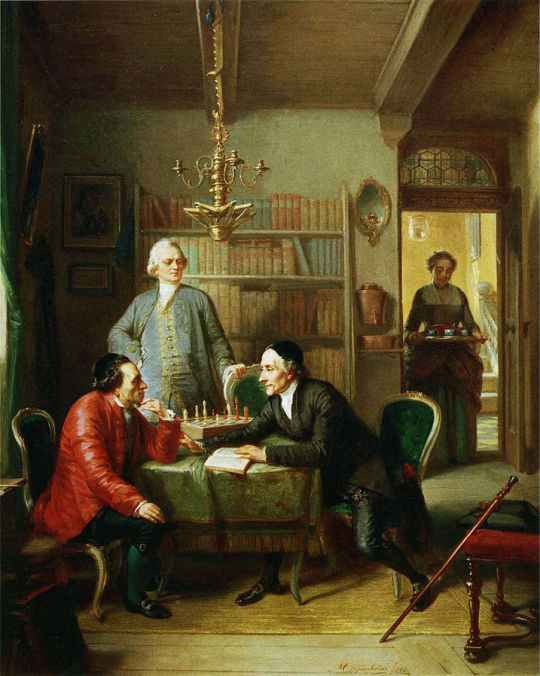#gotthold ephraim lessing
Explore tagged Tumblr posts
Text

Fabrizio Clerici (1913-1993) — Light of Lessing [oil on wood, 1976]
78 notes
·
View notes
Note
I saw your tag
#and 19th c biographical novels that depict historical figures in hilarious and disturbing ways
and wondered if you had any recommendations?
(It's not quite a biographical novel ,but you might like *Charles Auchester* by Elizabeth Sara Sheppard, who is Felix Mendelssohn idfic with the serial numbers filed off: see my review at https://landofnowhere.dreamwidth.org/99862.html.)
Thanks for the recommendation, Farouche! Your review has me excited to read Charles Auchester over the summer, and I'll try my hand at a few recommendations of my own.
I'll admit upfront that I've mostly read novels of this kind in German, and am not aware of translations for most of them right now. The novel I have the most experience with is Berthold Auerbach's Poet and Merchant: a Portrait of Life in the Time of Moses Mendelssohn, which is available in German here and English here. It takes as its subject the obscure and unhappy life of the poet Ephraim Moses Kuh, who after a difficult childhood receives the opportunity to travel to Berlin in the mid-18th century. This framework is mostly an excuse for Auerbach to include his favorite historical figures—Moses Mendelssohn, of course, but Lessing and Gleim show up in the army, and in Mendelssohn's living-room we get to meet Salomon Maimon, Aaron Gumperz and Johann Caspar Lavater. A.L. Karsch even shows up at a wedding, I think!
While the scenes of luminary debate are delightful, the overall arc of the story deals with heavy themes: What's the use of a poetic vocation? More broadly, what is fulfillment? How do you live as a person and citizen of a country that considers you neither? Unlike in Auchester (as far as I can tell; I'm only a few pages in), antisemitism features heavily in the story, both in scenes of individual violence and as a pall hanging over the characters trying to conduct their lives within inhuman limits. Auerbach's clearly turning to the 18th century with a 19th-century lens, in the hope that Mendelssohn's project can provide an answer to contemporary problems, so while his "portrait" is clearly made with love, it's not necessarily accurate. On the other hand, the novel develops certain interpersonal dynamics excellently; the unfolding understanding between Kuh and his uncle Veitel is one, and the enthusiastic, very R/romantic admiration between Kuh's sister Violet and Lessing is another.
I'm also reading Lessing: Roman by Hermann Klencke. As far as I know, it's only ever been published in German. It appears he's written a whole series of biographical novels of 18th-century German writers. My mutual @estomia has read his Gleim novel, but I haven't (yet).
Going a little out of bounds: Goethe's 1788 play Egmont (English) (German) features Machiavelli as a character in a surprisingly-chill portrayal (he's Margaret of Parma's little guy!), Thomas Mann's short story "Schwere Stunde" is good, but 20th-century, and a must-read for Schoethe shippers, and César Aira's novella An Episode in the Life of a Landscape Painter develops a fascinating thesis on the interplay of colonialism, art and dehumanization.
I'm really interested in historical fiction, esp. 18th-century historical fiction, as a window into how people conceived of contemporary problems, and as a tool of metanarrative-building (e.g. as a national origin story). That's taken me to some works of art that aren't necessarily "good" or fun to read, but certainly deserve more scholarly interest.
#I've translated a couple scenes of Egmont before and got to direct one with some brilliant talented friends#but not the scene with Machiavelli#because well. the play isn't very good#egmont#an episode in the life of a lanscape painter#poet and merchant#dichter und kaufmann#johann wolfgang von goethe#thomas mann#friedrich schiller#gotthold ephraim lessing#César Aira#charles auchester#elisabeth sheppard#ephraim moses kuh#berthold auerbach#hermann klencke#goethe#lessing#schiller#auerbücher#sherb's sub sub library
13 notes
·
View notes
Text

L'attesa del piacere, è essa stessa il piacere.
36 notes
·
View notes
Text
Niente al mondo è caso.
Gotthold Ephraim Lessing
16 notes
·
View notes
Text
Certainly the most exciting thing I've gotten from Dhalgren so far is the extent to which it captures the feeling of being born into a world. The sense of inaccessibility of the whole space reflected piecemeal by our perceptions is more intense here than any but the greatest modernist novels. Delany creates a protagonist, but obscures his identity; he creates a source text (in the notebook), but obscures its contents; creates a setting, but obscures its history. The novel carefully lays out the contradictions inherent to any attempt to create a whole to be perceived by others, the failure of the novel not only as a form for communicating some sense of personhood (as was a major of interest of Joyce and Woolf), but as a form for communicating any singular whole. The act of creation, in Dhalgren, is an obscurative one in that it causes information to be desirable and desired that cannot be accessed. The creation of an individual is then doubly obscuring, in that it creates within the individual an obscure world, and creates a new perspective from which parts of the exterior world may be obscured. Perhaps within some deistic systems, the collectivization of all perspectives can be seen as further illuminating, but within the context of human art and conversation, many perspectives are necessarily confusing and concealing.
Delany's style plays into this theme heavily. His descriptions are as precise as they are wandering, particularly when it comes to the human form and accoutrement, so that the characters and setting arise as a cubist interpolation of differing, disjoint perspectives corresponding to different, overlapping aspects of a whole. As is intrinsic to the poetic form (an extrapolation from Lessing's Laocoön), space cannot be properly conveyed and must instead be temporalized; but this means losing any sense of constancy of image, so that any object is piecemeal in that any description of an object is a function of time as well as space. There is no going back, there is no seeing an object as it once was.
#book review#books#dhalgren#samuel delany#samuel r delany#media analysis#science fiction#sci fi#modernism#modernist#james joyce#virginia woolf#gotthold ephraim lessing#laocoon
4 notes
·
View notes
Text
Café Prinzess in Regensburg - das älteste Kaffeehaus Deutschlands (Update)
Ein Ausflug nach Regensburg vor etwas über zwei Jahren hatte eine faustdicke Überraschung für mich parat. Doch der Reihe nach. Fest eingeplant bei meiner 9-Euro-Ticket-Tour nach Regensburg war nämlich ein Kaffee-und-Kuchen-Stopp in einem dort ansässigen Kaffee. Ich hatte mir vorab einige Cafés im Internet angesehen und mich dann, auch wegen der zentralen Lage, für das Café Prinzess entschieden.…
#coffeenewstom#9-Euro-Ticket#9-Euro-Ticket-Tours#August der Starke#Barbara Blomberg#Barbara Blomberg Torte#Café Prinzess#Café Procope#Caffè Florian#Christian Fürchtegott Gellert#Coffeenewstom#Don Juan de Austria#E. T. A. Hoffmann#Francesco Procopio dei Coltelli#Franz Listz#Goethe#Gotthold Ephraim Lessing#Gustav Mahler#Johann Christoph Gottsched#Johann Sebastian Bach#Johannes Theodat#Kafenion Bekir Karakusu#Kaiser Karl V.#Karl V.#Leipzig#Leonhard Rauwolf#Mevlana Shisha Bar#Mevlana Turkish Coffee#Napoléon#Napoléon Bonaparte
4 notes
·
View notes
Text
Yesterday I loved, Today I suffer, Tomorrow I die, Yet today and tomorrow I like to think Of yesterday.
Gotthold Ephraim Lessing
13 notes
·
View notes
Text

Kein Mensch muss müssen. /Gotthold Ephraim Lessing
2 notes
·
View notes
Text
L'attesa del piacere è essa stessa il piacere.
Gotthold Ephraim Lessing
2 notes
·
View notes
Text

Concepts: Free Thinkers
Think wrongly, if you please, but in all cases think for yourself.
#gotthold ephraim lessing#thinking#free thought#philosophy#concepts#concept art#Concept aesthetic#Concept moodboard#Aesthetic#moodboard#aesthetics#character inspo#character inspiration#character design#character types#character aesthetic#character moodboard#character#Characters#free thinking#Free speaker
9 notes
·
View notes
Text
Ja Georg Stark, du bist was ganz großem auf der Spur, ich bin mir ganz sicher!!

#gotthold ephraim lessing#nazischeiße#nordisch zeichnen aka tellheim ist schwer depressiv#die nordische zeichnung#meint ihr der tellheim ist so ein urarier? So diese großen Kollegen aus dem Weltall mit der schneeweißen Haut und dem blauen Blut#die 2m groß sind#meint ihr tellheim lent in der hohlerde?#normal ppl: Hey how is it oing oder so
2 notes
·
View notes
Text
the thing about reading Nathan der Weise is that I frequently stop while reading and think to myself "oh man this play is so strange and compelling how am I the only one to read it"
but actually no I'm not. It's required reading for the majority of german highschool students. It's so old that it's one of the only german-language works you can reasonably expect every reader/critic to have a take on. Moses Mendelssohn may or may not have named one of his children after the play/his friend. People have staged it around the world. I just happen to reside in a place where it's never been produced.
I am Letters Georg, who lives in the United States and thinks about the Lessing-Mendelssohn correspondance 10,000 times a day: the outlier hwo should not be counted
#if you guys had to read this play in school how did it go#nathan the wise#nathan der weise#gotthold ephraim lessing#lessing#rhymes with thaumaturge
12 notes
·
View notes
Text
"Die Christen glauben mehr Armseligkeiten / Als daß sie die nicht auch noch glauben könnten! / Und gleichwohl irrst du dich. – Die Tempelherren, / Die Christen nicht, sind schuld: sind nicht, als Christen, /Als Tempelherren schuld."
Gotthold Ephraim Lessing stelle mit diesen Worten schon 1779 fest, das vielleicht einfach religiöse Fanatiker Kacke sind und nicht die Religion selbst. Sind wir ehrlich: Irgendwie ist das ne Sache die heute, etwa 250 Jahre später, noch immer ein Großteil der Gesellschaft nicht versteht. Wir befinden uns aktuell genau eine Woche nach der sächsischen Landtagswahl, die wie wir alle wissen eine absolute Katastrophe war. Und während aktuell auch wieder vermehrt das Migrationsthema in sämtlichen Talkshows der Bundesrepublik auf entmenschlichende Weise verhandelt wird bringt das Staatsschauspiel Dresden eine Inszenierung von Lessings 'Nathan der Weise' auf die Bühne, die alles tut um sich ja nicht selbst ernst nehmen zu müssen.
Das Stück war eine Menge. Und eine Menge war es nicht.
Irgendwo zwischen einer komplett pinken, Mad-Max-artigen Kriegsdystopie und einer altertümlichen Bibliothek wird hier in zweieinhalb Stunden Lessings Werk, in Regie von Hermann Schmidt-Rahmer, vorgetragen. Mal war es laut und chaotisch, mit Trommeln, Gebrülle und Stichflamme, dann wieder so leise, dass sich die Leute hinter mir beschwerten das man ja gar nichts verstehe. Mal so monoton, dass Lessings Worte, von denen man ein jedes einzelne eigentlich dreimal nach dem Sinn umdrehen kann, um es dann auf eine Goldwaage zu legen, völlig in der statisch-rauschenden Atmosphäre untergehen, dann wieder emotionsgeladen und so real das ich in meinem Sitz regelrecht erschreckt zusammengesinke. Mal befinden wir uns in einer verstörend anmutenden Hinrichtungsszene, dann an einem absurden Stand-Up-Abend, an dem Nathan seine bekannte Ringparabel mit viel Emotion, aber unter ständigem Unterbrechungen, vortragen darf. Mal mit Blickkontakt ans Publikum gerichtet, mal unterhaltsam miteinander plänkelnd, aber meistens dann doch irgendwie nur mit sich selbst beschäftigt werden hier wortreiche Sätze rezitiert, ohne ihnen wirklich die Bedeutung zuzugestehen, die sie verdient haben.
Nur an wenigen Stellen bricht das Stück aus seinem Originaltext aus - kurz am Anfang, ganz dystopisch und dann kurz nach der Pause, mit einer Mischung aus zusammengestückelten Monologen zum aktuellen Zeitgeschehen. Zu beiden Passgen finden sich in meinem Notizbuch nur folgende Vermerke: "Das (ist) ganz wild und unangenehm. Neeeee."
Alles in allem hätten weniger Selbstironie und -parodie dem Stück gutgetan, gerade in der aktuellen Zeit. Ich verstehe was man damit aussagen wollte, aber besonders bekömmlicher wird die Message dadurch nicht. Die Utopie der allseitigen, gegenseitigen Toleranz wirkt momentan ferner denn je - dies auf einer großen Bühne dann also zu einem absurden, ja schon lachhaftem Hirngespinst zu erklären stößt mir dann doch eher sauer auf.
Was ich aus dem Stück mitnehme, sind die Tatsachen das unser Spielzeitneuzugang Paul Kutzner ziemlich was drauf hat, Phillip Grimm einen hervorragenden Patrick Bateman abgeben würde und ich endlich aufhören sollte mit massiven Kopfschmerzen ins Theater zu gehen - denn die werden dabei in der Regel noch schlimmer.
Zurück bleibt irgendwie... nicht viel. Alles in allem war dieser Abend einfach nur nichtssagend und ein bisschen frustrierend.
#sunnys theater rambles#sunnys theater review#staatschauspiel dresden#deutsches zeug#german stuff#theater#deutsches theater#ich glaube das ist das erste mal das ich eine so schlechte Kritik schreibe#aber feierlich war das wirklich nicht#schade - hatte mir von der Inszenierung einiges erhofft#nathan der weise#gotthold ephraim lessing
5 notes
·
View notes
Text

Moritz Daniel Oppenheim (German, 1800–1882) Levator and Lessing as guests in the home of Moses Mendelssohn (1856)
9 notes
·
View notes
Text
persona404.org
2 notes
·
View notes
Text
If I had a nickel for every play I've read this year in which the main character's child who has a strange relationship to their father accidentally falls in love with their (half-)sibling, I'd have two nickels. Which isn't a lot, but it's weird that it happened twice.
#Nathan der Weise#Nathan the Wise#Gotthold Ephraim Lessing#Ghosts#Henrik Ibsen#Ibsen's Ghosts#shitpost
2 notes
·
View notes